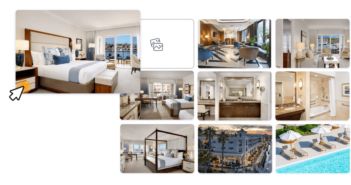Every hotel that wants to hold on to and grow its direct bookings is going to need a booking engine.
A booking engine enables a hotel to accept direct bookings online through its official website. And as travelers increasingly book their hotels online, having a booking engine will make all the difference between staying competitive and giving up a growing amount of direct business.
Not just any old booking engine will do, however. A main reason why OTAs have been so successful at capturing online bookings is that their booking pages are optimized for converting users. To compete with the OTAs, then, hotels will need to use equally optimized booking-engine technology.
So we’ll say it again. Every hotel that wants direct bookings needs a booking engine. And every competitive hotel booking engine will be optimized for conversion by facilitating a simple, seamless, and secure booking experience for travelers.
Here are three more key features to look for in a hotel booking engine:
#1 Integration with hotel metasearch sites
Why it’s important: Those who’ve had the chance to attend one of our webinars will be familiar with the following statistic: One traveler out of two uses metasearch when searching for hotels to book online. A recent Phocuswright report revealed that 50% of US online hotel bookers completed a hotel booking on or through a metasearch site at least once in the past year.
When we single out millennial travelers, a demographic that continues to increase its travel spending and influence on travel trends, the percentage of travelers who go through a metasearch site to book their hotels online is higher still at 63%.
The takeaway: We’ve said it before, but it bears repeating: The direct booking journey has moved to metasearch. To stay competitive and tap into this direct business potential, hotels will need a booking engine that’s integrated with top hotel metasearch sites so that they can advertise their direct rates on these high-potential channels.
#2 Optimized for mobile bookings
Why it’s important: Mobile hotel bookings are on the rise. Another report put forth by Phocuswright highlights the steady global shift of travelers using mobile devices to book accommodation.
The following graph shows Phocuswright’s projected trajectory of the mobile share of online bookings in the European and US markets:

The takeaway: Any hotel booking engine worth its salt will be optimized to turn mobile traffic into direct bookings. This means the content on the booking engine displays correctly and functions smoothly on every device.
#3 Customizable with the hotel’s own logo, images, and descriptions
Why it’s important: Brand awareness, mainly, but also conversion success and online reputation.
Having the hotel’s images and descriptions on the booking engine sets accurate expectations for the traveler, laying the foundations of a positive experience for the guest and a positive online reputation for the hotel. It also helps create a seamless booking journey, something crucial to conversion success.
And having the hotel’s logo visible throughout the entire booking stage means the guest knows exactly with whom they’re booking. This helps nurture the relationship between hotel and guest and foster a strong brand awareness for the hotel.
The takeaway: If a hotel wants to fully own its guest experience and customer relationships (and enjoy the benefits of increased brand awareness), it needs to be able to customize its booking engine with its own logo, images, and descriptions. Anything less would compromise the hotel’s brand image and perhaps even its conversion rate and online reputation as well.
Additional features and benefits to look for in a hotel booking engine:
A booking engine with all the above key features, as well as all the following added advantages, would be a huge asset to a hotel business.
Such a booking engine would also be the all-in-one solution for any hotel looking to not only increase its direct bookings, but extend its market reach, simplify its day-to-day activities, and open new direct booking channels as well.
Access to foreign markets
To reach foreign travelers in international markets, a hotel’s booking engine needs to be able to support multiple languages and currencies. If it doesn’t, the hotel will have a challenging time increasing their market reach and converting travelers who speak different languages.
Integration with a hotel’s property management system and channel manager
A channel manager enables hoteliers to control their distribution, while a property management system simplifies and streamlines a hotel’s day-to-day operations, including processing reservations. Ideally, the hotel’s booking engine will be integrated with both pieces of crucial hotel technology.
Book-on-Facebook functionality
We recently published an article on how hotels can use social media to drive direct bookings. Taking that one step further, some booking engines enable the hotel to capture direct bookings on its Facebook Page. Considering how effective social media is in attracting qualified traffic, this feature is definitely a nice one to have in a hotel booking engine.
In the new era of travel we’re now entering, your digital marketing initiatives are going to matter more than ever. To equip yourself with the right booking engine, we recommend teaming up with PHOBS.
Their booking engine has been designed by hoteliers, so you know it’s going to be customizable, flexible, and most of all conversion focused. Plus, there are no pricey installment fees to pay either.
To learn how PHOBS’s booking engine can help jump-start your booking conversion, reach out to their team today for an exclusive one-to-one session.
Schedule your session



